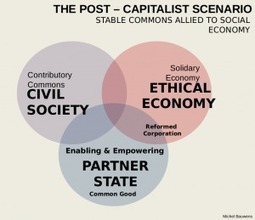In my experience, revolution is used in two quite different senses; in a generic sense, it just means a ‘big change’, like for example when we speak about the Industrial Revolution, this was a long and drawn out process, with many aspects and it would be really difficult to identify with one particular event. Yet at the same time, there is clearly a time when industrial changes emerged in a mostly agrarian context, and a time when it is the industrial processes and forms of organisation which are dominant, and the agrarian aspects subsumed under that domination. Clearly, between these two moments, a ‘phase transition’ has occurred.
Research and publish the best content.
Get Started for FREE
Sign up with Facebook Sign up with X
I don't have a Facebook or a X account
Already have an account: Login
on peer-to-peer dynamics in politics, the economy and organizations
Curated by
jean lievens
 Your new post is loading... Your new post is loading...
|
|




















